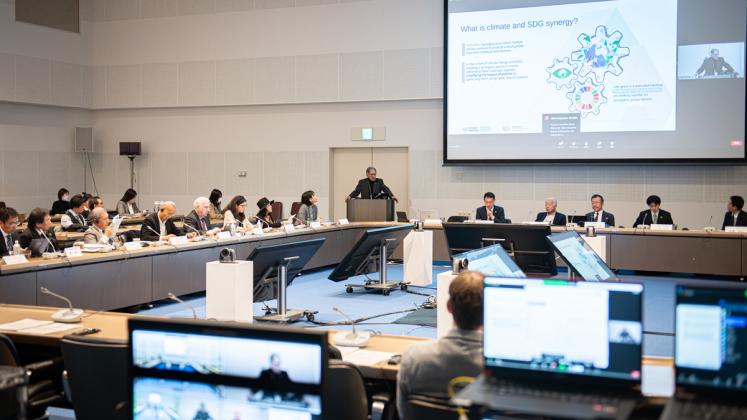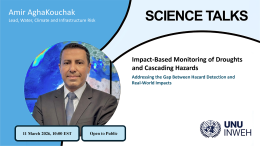On 6 March 2024, UNU-IAS co-organized a public symposium on synergy approaches for achieving the SDGs. The event was held as part of expert meetings co-convened by the UN Department of Economic and Social Affairs (UNDESA) and the UN Framework Convention on Climate Change (UNFCCC) Secretariat on 4–6 March 2024 at UNU headquarters in Tokyo. Hosted by the Ministry of the Environment of Japan (MOEJ), the meetings brought together more than 60 experts to discuss climate and SDG synergies, as well as progress on SDG 13 (climate action) ahead of the 2024 High Level Political Forum on Sustainable Development (HLPF).
Opening the symposium, Kotaro Kawakita (Director, International Strategy Division, Global Environment Bureau, Ministry of the Environment Japan) stressed the importance of integrated solutions to maximize synergies and minimize trade-offs in addressing the triple environmental crisis — climate change, biodiversity loss and pollution.
Shinobu Yume Yamaguchi (Director, UNU-IAS) pointed out that the transition to decarbonization could increase vulnerabilities and inequalities if not managed carefully, but it could also create new opportunities. She emphasized the need for people-centered climate action to achieve a just transition, built on comprehensive and strategic frameworks targeting issues related to gender, poverty and inequality.
Noting that synergistic approaches were a top priority of the UN, Bahareh Seyedi (Senior Sustainable Development Officer, UN DESA) highlighted multistakeholder partnerships as a key component of the 2030 Agenda for Sustainable Development. Daniele Violetti (Senior Director, Programmes Coordination, UNFCCC) added that the symposium provided a platform for various stakeholders to share the latest knowledge on global issues and encouraged further discussions to promote SDG synergies.
A keynote speech by Luis Gomez Echeverri (Emeritus Research Scholar, International Institute for Applied Systems Analysis; Co-Lead, Expert Group on Climate and SDG Synergy) shared the outcomes of the Third Global Conference on Strengthening Synergies between the Paris Agreement and the 2030 Agenda for Sustainable Development and the 2023 Global Report on Climate and SDG Synergy. He stressed the importance of breaking down silos between sectors, advancing evidence-based synergetic actions, and multi-stakeholder dialogues at all levels to accelerate action for sustainable development and tackle climate change.
A panel discussion explored examples of synergy approaches led by multiple sectors, such as the International Partnership for the Satoyama Initiative (IPSI). Kazuhiko Takeuchi (President, IGES) moderated the session, highlighting the importance of science-based discussions, multi-stakeholder participation and climate actions that consider the Global South.
Akio Takemoto (Head of Programme and Administration, UNU-IAS) spoke about greenhouse gas (GHG) emissions from food systems, and the environmental and social impacts of critical minerals extraction, which are essential resources for climate action. He emphasized the need for data correction and maintenance to ensure transparency when implementing the Paris Agreement, calling for an international framework to address these issues.
The symposium was organized by UNU-IAS, MOEJ and the Institute for Global Environmental Strategies (IGES).



